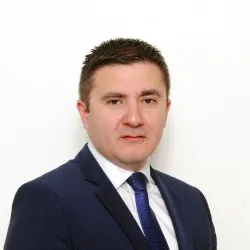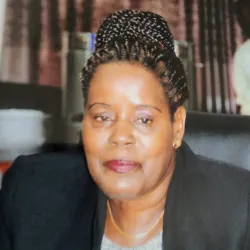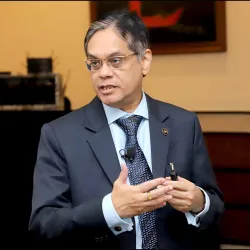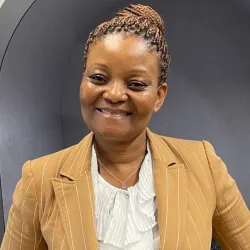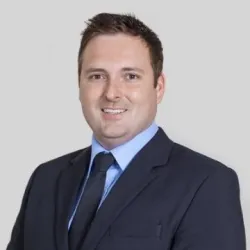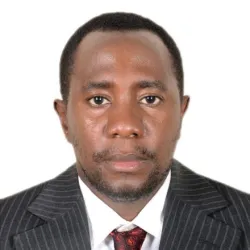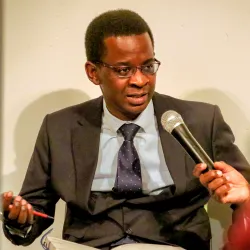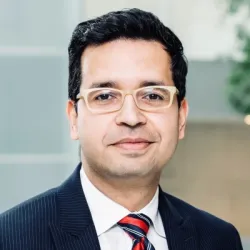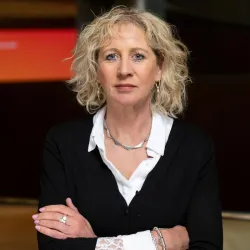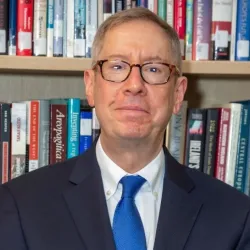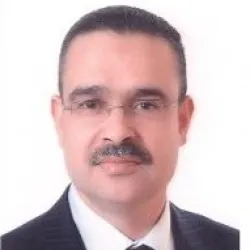2024 Agenda
2024 Agenda
Agenda 2024
Reserve Management - Day 1 - 5th March
08:00 – 09:00
Registration and breakfast
08:00 - 09:00
09:00 – 09:15
Welcome to the Spring Meetings
09:00 - 09:30
Christopher Jeffery is Editor of Central Banking Publications, which includes the Central Banking Journal, CentralBanking.com and Central Banking On Air. He has more than 15 years of experience covering banking, business, economics, finance and public policy in London, Hong Kong and New York. His interviews include those with Agustín Carstens, Stanley Fisher, Stefan Ingves, Ahmed Alkholifey, Raghuram Rajan, Robert Schiller and Christopher Sims. Chris is Chairman of the Central Banking Awards Committee and is Editor of IFF China Report, a publication offering insight and opinion from China’s top policymakers. Chris was previously Editor of Asia Risk in Hong Kong and Deputy Editor of Risk in London
09:15 – 09:30
Opening plenary executive address
09:30 - 10:00
Marko Vidaković, M.Sc. has been born in Sarajevo, Centar municipality, on 16 September 1984. After finishing elementary school and gymnasium in Istočna Ilidža, he attended Faculty of Economics at the University in Istočno Sarajevo, where he acquired the title of graduate economist. After graduation, he attended master studies at the same faculty and successfully defended his master's thesis on "Macroprudential Policies in the Function of Preserving Stability of Financial Systems in Western Balkans Countries“, and thus acquired master's degree in the field of economics.
In the period 2010 – 2011, he worked in the Ministry of Defence of Bosnia and Herzegovina in Finance and Budget Department. After that, he was engaged in „MH ERS ZP Elektrodistribucija Pale“ a.d. During 2012, he was appointed Adviser for Economic Issues of the Member of BH Presidency from Republika Srpska, and in 2013, Head of the Office of the Member of BH Presidency from Republika Srpska. In 2014, he was elected Representative in the National Assembly of Republika Srpska, where his professional engagement lasted until 2018. In the period 2016 - 2018, he performed the duty of Deputy President of the Audit Committee of the National Assembly of Republika Srpska. He also performed many other duties in private and public sectors.
He participated in a number of international and local conferences, scientific events and in their organisation. He has a high level of knowledge of English and computer skills.
From 2018, he worked as Senior Officer for Financial Stability Risk Assessment in the Financial Stability Department in the Central Bank of Bosnia and Herzegovina (CBBH). He was also acting Manager of Financial Stability Risks Analyses and Reporting Section.
At the 2 meeting held on 25 February 2022, the Governing Board of the Central Bank of Bosnia and Herzegovina (CBBH) appointed Marko Vidaković, M.Sc. as Vice Governor of the CBBH, in charge of the Sector for Monetary Operations, Management of Foreign Exchange Reserves and Cash, for a four year long term of office, starting from 1 March 2022 until 28 February 2026.
09:30 – 09:45
Chair's opening remarks.
10:15 - 10:30
Judith Ndissi is a financial sector development specialist with over 30 years of experience. She worked for the Bank of Tanzania and held several managerial and director roles in financial markets. She was the Director Financial Markets until her retirement from the Bank of Tanzania in 2013.
She holds a Bachelor of Arts degree in Economics from Waynesburg College, Pennsylvania, USA, and a Masters degree in Economics from Ohio University, Ohio, USA.
After retirement, she worked as a consultant for Macro Economic and Financial Management Institute( MEFMI) in Harare and Industrial and Commercial Bank of China ( ICBC), Hong Kong.
Currently, she is the non executive board director of Stanbic Bank Tanzania Ltd.
09:45 – 10:45
An overview of markets during a time of high economic volatility and uncertainty
10:30 - 11:30
- How are central banks managing inflation expectations and their monetary policy
- Supply chain constraints, geopolitical shocks and pandemic-related issues continue to be key in central banking decision making
- Looking at the perfomance and voltality of financial markets in recent times
- Reserve management trends and outlook for 2024
Judith Ndissi is a financial sector development specialist with over 30 years of experience. She worked for the Bank of Tanzania and held several managerial and director roles in financial markets. She was the Director Financial Markets until her retirement from the Bank of Tanzania in 2013.
She holds a Bachelor of Arts degree in Economics from Waynesburg College, Pennsylvania, USA, and a Masters degree in Economics from Ohio University, Ohio, USA.
After retirement, she worked as a consultant for Macro Economic and Financial Management Institute( MEFMI) in Harare and Industrial and Commercial Bank of China ( ICBC), Hong Kong.
Currently, she is the non executive board director of Stanbic Bank Tanzania Ltd.
10:45 – 11:15
Networking break
11:30 - 12:00
11:15 – 12:15
Strategic asset allocation through big changes in market environments
14:30 - 15:30
Sponsored by:

- Evaluating the role and application of strategic asset allocation when regimes shift
- Discussing relevant investment horizons for central bank investment policy design, execution and evaluation
- Looking at long term investment diversification and asset allocation under market volatility
- Discussing various asset classes for efficient portfolio diversification
Baitshenotse Nnana Mmopelwa is the Deputy Director in the Financial Markets Department and member of the Investment Committee at the Bank of Botswana. She joined the Bank in July 1998 as a Money Market Dealer and progressed to perform different roles in the Financial Markets Department. Her experience in reserves management spans over two decades, spending majority of the time in the International Dealing and Strategy Unit, which is responsible for building and implementing portfolio strategic and tactical asset allocation across developed and emerging markets. Baitshenotse also worked in the Risk Management Unit that is responsible for portfolio risk monitoring and fund managers’ compliance to investment guidelines. Her current role involves overseeing the two units and providing expert advice on market analysis and investment strategy for the country’s sovereign wealth fund (Pula Fund).
Baitshenotse received her Bachelor of Arts degree in Economics from University of Botswana and a Master of Arts degree in Economics from the University of Stellenbosch (South Africa). She also holds a Postgraduate Certificate in Project Finance from Middlesex University.
Roberts Grava is Chief Executive Officer of Crown Agents Investment Management. He brings over 25 years of global institutional asset management experience to the firm, having focused mainly on sovereign investment institutions and official sector investment issues. He has held several senior roles in public and private sector institutions, including Head of Official Institutions, Institutional Solutions and Advisory and Managing Director, Fixed Income at J.P. Morgan Asset Management, Head of Quantitative Strategies, Risk and Analytics and Engagement Manager, Reserves Advisory and Management Program (RAMP) at the World Bank. Previously, he had spent 11 years as Chief Investment Officer, Head of Reserves Management and Market Operations and Member of the Executive Board at Latvijas Banka, the central bank of Latvia. He has a degree in Economics from Columbia University and is a CFA charterholder.
Carl Julian Masson (Julian) is a Senior Portfolio Manager at the South African Reserve Bank.
He assumed his position in the Reserves Management Unit, Financial Markets Department in April 2022. His main responsibilities include the management of Global Fixed Income portfolios.
Philip Dongsoo Hong
Senior financial officer, Reserve Advisory and Management Partnership (RAMP)
World Bank
Philip Dongsoo Hong is Senior Financial Officer and Engagement Manager of Reserves Advisory and Management Partnership (RAMP) at World Bank Treasury. He is responsible for the coordination and development of technical assistance for RAMP clients and partners.
Prior to joining the World Bank, Philip worked at Bank of Korea (BOK) in various positions for more than twenty-five years - mostly in reserve management, financial stability, and research. He was Deputy Director-General and Head of Investment Strategy Team in Reserve Management Group from 2014-2015, responsible for the tactical asset allocation and active management of the BOK's foreign reserves. From 2011 to 2013, he served as Head of Global Agenda Team coordinating G20 meetings and working groups such as Capital Flow Management and Global Liquidity. He also served as Head of Strategic Planning Team responsible for bank-wide strategic priorities and operational risk management. Prior to that, he was a Senior Investment Officer at BOK’s New York Office, managing USD portfolios comprising Treasuries, Agencies, Corporates, MBS and ABS during the global financial crisis from 2007 to 2010.
Outside the Bank of Korea, in 2002, he worked for Secretariat of the Basel Committee on Banking Supervision as a visiting research fellow, leading a survey on risk management for non-G10 countries regarding Basel II. From 2006 to 2007, he served as a senior advisor to the Senior Secretary to the President for economic affairs, coordinating inter-departmental issues in Korea.
Philip earned a Ph.D. in Economics from Dongguk University in Seoul and MA in Economics from University of Michigan. He also earned his MBA and BA in Business Administration from Korea University in Seoul. Philip is a CFA charter holder.
12:15 – 12:45
Group photo
13:00 - 13:15
12:45 – 14:15
Networking lunch
12:15 - 13:45
14:15 – 15:15
The risks and benefits of tactical asset allocation under current market pressures
12:00 - 13:00
Sponsored by:

- How can portfolio managers prepare and benefit from tactical asset allocation under economic uncertainty and volatility?
- Discussing appropriate investment time horizons, risk appetite and asset classes
- High macro volatility prompts portfolio managers to increase risk resilience and go on to adopt granular investment strategies
- How can investors change their portfolio and adapt or accept a higher volatility in investment results?
Jonas Stulz is Head of Portfolio Management and Deputy Head of Asset Management at Swiss National Bank (SNB). His teams of portfolio managers in Zurich and Singapore are responsible for the active management of the fixed income portfolios within SNB’s foreign currency reserves. These portfolios include government and supra-sovereign bonds (rates) as well as investment grade corporate bonds and covered bonds (credit). He is based in Zurich. Jonas joined SNB in 2003; prior to his current position, he was Head of Global Rates at SNB. Before that, he worked as a Senior Economist and as a Senior Portfolio Manager for this institution. He holds a master degree in Economics from University of St. Gallen and a doctorate in monetary macroeconomics from University of Basel. Furthermore, he is a Certified Financial Risk Manager (FRM) with the Global Association of Risk Professionals (GARP). Jonas Stulz is married with two children.
Portfolio Management Team, Invesco Quantitative Strategies based in Frankfurt.
Erhard joined Invesco in August 2017 as a portfolio manager focusing on balanced accounts and capital protected products. Furthermore, Erhard is contributing to the sustainability team focusing on integrating ESG aspects into the systematic investment process. He started his career as a portfolio manager in Deutsche Asset Management’s institutional Multi Asset and Risk Overlay team. Erhard holds a Master’s degree in Theoretical Physics from the Humboldt University Berlin.
15:15 – 15:45
Networking break
11:30 - 12:00
15:45 – 16:45
Working Groups: Eurobonds and 2024 biggest challenges to central bank reserves management practices
15:45 - 16:45
Given inflation, what alternate assets can central banks invest in? Eg: Robotics, AI, climate bonds, etc.
Judith Ndissi is a financial sector development specialist with over 30 years of experience. She worked for the Bank of Tanzania and held several managerial and director roles in financial markets. She was the Director Financial Markets until her retirement from the Bank of Tanzania in 2013.
She holds a Bachelor of Arts degree in Economics from Waynesburg College, Pennsylvania, USA, and a Masters degree in Economics from Ohio University, Ohio, USA.
After retirement, she worked as a consultant for Macro Economic and Financial Management Institute( MEFMI) in Harare and Industrial and Commercial Bank of China ( ICBC), Hong Kong.
Currently, she is the non executive board director of Stanbic Bank Tanzania Ltd.
16:45 – 17:00
Chair's closing remarks.
16:45 - 17:00
Judith Ndissi is a financial sector development specialist with over 30 years of experience. She worked for the Bank of Tanzania and held several managerial and director roles in financial markets. She was the Director Financial Markets until her retirement from the Bank of Tanzania in 2013.
She holds a Bachelor of Arts degree in Economics from Waynesburg College, Pennsylvania, USA, and a Masters degree in Economics from Ohio University, Ohio, USA.
After retirement, she worked as a consultant for Macro Economic and Financial Management Institute( MEFMI) in Harare and Industrial and Commercial Bank of China ( ICBC), Hong Kong.
Currently, she is the non executive board director of Stanbic Bank Tanzania Ltd.
17:00 – 19:00
Networking and drinks reception
17:00 - 19:00
Innovation - Day 1 - 5th March
08:00 – 09:00
Registration and breakfast
08:00 - 09:00
09:00 – 09:15
Welcome to the Spring Meetings
09:00 - 09:30
Christopher Jeffery is Editor of Central Banking Publications, which includes the Central Banking Journal, CentralBanking.com and Central Banking On Air. He has more than 15 years of experience covering banking, business, economics, finance and public policy in London, Hong Kong and New York. His interviews include those with Agustín Carstens, Stanley Fisher, Stefan Ingves, Ahmed Alkholifey, Raghuram Rajan, Robert Schiller and Christopher Sims. Chris is Chairman of the Central Banking Awards Committee and is Editor of IFF China Report, a publication offering insight and opinion from China’s top policymakers. Chris was previously Editor of Asia Risk in Hong Kong and Deputy Editor of Risk in London
09:15 – 09:30
Opening plenary executive address
09:30 - 10:00
Marko Vidaković, M.Sc. has been born in Sarajevo, Centar municipality, on 16 September 1984. After finishing elementary school and gymnasium in Istočna Ilidža, he attended Faculty of Economics at the University in Istočno Sarajevo, where he acquired the title of graduate economist. After graduation, he attended master studies at the same faculty and successfully defended his master's thesis on "Macroprudential Policies in the Function of Preserving Stability of Financial Systems in Western Balkans Countries“, and thus acquired master's degree in the field of economics.
In the period 2010 – 2011, he worked in the Ministry of Defence of Bosnia and Herzegovina in Finance and Budget Department. After that, he was engaged in „MH ERS ZP Elektrodistribucija Pale“ a.d. During 2012, he was appointed Adviser for Economic Issues of the Member of BH Presidency from Republika Srpska, and in 2013, Head of the Office of the Member of BH Presidency from Republika Srpska. In 2014, he was elected Representative in the National Assembly of Republika Srpska, where his professional engagement lasted until 2018. In the period 2016 - 2018, he performed the duty of Deputy President of the Audit Committee of the National Assembly of Republika Srpska. He also performed many other duties in private and public sectors.
He participated in a number of international and local conferences, scientific events and in their organisation. He has a high level of knowledge of English and computer skills.
From 2018, he worked as Senior Officer for Financial Stability Risk Assessment in the Financial Stability Department in the Central Bank of Bosnia and Herzegovina (CBBH). He was also acting Manager of Financial Stability Risks Analyses and Reporting Section.
At the 2 meeting held on 25 February 2022, the Governing Board of the Central Bank of Bosnia and Herzegovina (CBBH) appointed Marko Vidaković, M.Sc. as Vice Governor of the CBBH, in charge of the Sector for Monetary Operations, Management of Foreign Exchange Reserves and Cash, for a four year long term of office, starting from 1 March 2022 until 28 February 2026.
09:30 – 09:45
Chair's opening remarks
10:15 - 10:30
Stephen Mwaura
Chairman, Fintech Institute & former head of national payments systems
Former Central Bank of Kenya
Stephen is an international consultant with broad expertise for over 25 years in digital financial services, payment systems, central banking practices and legal and regulatory frameworks. Prior to working as an International consultant, Stephen was in charge of the National Payments System division at the Central Bank of Kenya, where he championed financial inclusion initiatives in Kenya- key among them was the globally recognised M-Pesa platform run by Safaricom which currently has 27 million subscribers, equivalent to a penetration rate of 75% in mobile money sector.
Stephen has considerable experience working with a wide range of stakeholders in the digital financial world (Telecommunication firms, Banks, donor organisations, Treasury, other regulators). At a regional level, he has extended his leadership expertise in the harmonisation of various initiatives at an East Africa Community (EAC) level. At an international level, he is a regular contributor and an acclaimed global speaker at both International Telecommunications Union (ITU) and Alliance for Financial Inclusion (AFI) fora. In addition, he has excellent research capabilities and is frequently requested to carry out peer review assignments and book reviews for colleagues in the industry
09:45 – 10:45
How can central banks build a more inclusive fintech ecosystem?
10:30 - 11:30
- Micropayments' increasing role in Fintech and to an extent in CBDCs as well
- Examples of fintech accelerators and payment systems
- How are central banks striking an effective balance both as accelerators and regulators of fintech and innovation
- Fintech's path to digital inclusion
CPA Andrew Kawere is a banking professional with extensive experience in finance, audit and financial sector regulation, obtained in diverse sectors, both public and private. Andrew started his now 20-year career with a stint in public practice, while working with KPMG. He later on moved to East African Development Bank and Bank of Uganda where he has served in different roles over the years, growing through the ranks to Head of Division at the Central Bank.
Until December 2020, Andrew oversaw the regulation and supervision of Non-Bank Financial Institutions in the Bank of Uganda Supervision Directorate. Effective January 2021, Andrew serves in the National Payment Systems Department of Bank of Uganda, where he is tasked with implementation of the National Payment Systems Act, 2020 and the regulations thereunder. He is directly responsible for the regulation, licensing, supervision and oversight of payment service providers such as electronic money issuers. Andrew led the development of the first e-payments strategy for the Central Bank, the establishment of the payment systems oversight function and the design of the attendant business processes to support the oversight activities. He has spoken at different fora about risk management, payment systems oversight and digital financial services.
Among other professional responsibilities, Andrew is a retired three term founder board member at the Information Systems Audit and Control Association - ISACA Kampala Chapter, represented the Institute of Certified Public Accountants of Uganda on the National Information Security Advisory Group and currently sits on the Industry and Business Panel of the Professional Standards Committee of Council at the Institute of Certified Public Accountants of Uganda.
Stephen Mwaura
Chairman, Fintech Institute & former head of national payments systems
Former Central Bank of Kenya
Stephen is an international consultant with broad expertise for over 25 years in digital financial services, payment systems, central banking practices and legal and regulatory frameworks. Prior to working as an International consultant, Stephen was in charge of the National Payments System division at the Central Bank of Kenya, where he championed financial inclusion initiatives in Kenya- key among them was the globally recognised M-Pesa platform run by Safaricom which currently has 27 million subscribers, equivalent to a penetration rate of 75% in mobile money sector.
Stephen has considerable experience working with a wide range of stakeholders in the digital financial world (Telecommunication firms, Banks, donor organisations, Treasury, other regulators). At a regional level, he has extended his leadership expertise in the harmonisation of various initiatives at an East Africa Community (EAC) level. At an international level, he is a regular contributor and an acclaimed global speaker at both International Telecommunications Union (ITU) and Alliance for Financial Inclusion (AFI) fora. In addition, he has excellent research capabilities and is frequently requested to carry out peer review assignments and book reviews for colleagues in the industry
10:45 – 11:15
Networking break
11:30 - 12:00
11:15 – 12:15
Presentation: Third party risk management - from regulation to practice
14:30 - 15:30
- Expectations on managing third-party risk
- Guidance on risk-management frameworks and lifecycles
- Assessing the levels of risk-impact
- Governance and best practices around oversight, independent reviews, and documentation & reporting
All financial organizations currently face an exceptionally challenging external environment: increasing regulatory pressures, heavy reliance on external third-parties, dominance of cloud based services and Artificial Intelligence (AI), all amid makes issues related to Third Party Risk Management prominent for both regulators and organizations alike.
With a track record of successfully establishing a robust third party risk management (TPRM) function at the International Monetary Fund (IMF), Section Chief, Suyog Peshkar brings a unique perspective on the intersection of operational risks and outsourcing.
In his twenty plus years’ experience, Suyog has advised global firms as well as provided hands-on expertise in delivering outsourcing solutions to generate higher cost savings, mitigate risks and derive efficiencies. Suyog completed a LLM in Commercial and Corporate Law from the University of London and a Masters in Analysis, Design and Management of Information Systems from the London School of Economics (LSE), which enables him to provide ‘techno-legal’ advisory on complex issues related to sourcing governance, risk management and third party compliance.
Recognized as an operational and third party risk expert, Suyog is regularly invited to speak at industry conferences, risk panels and UN seminars.
12:15 – 12:45
Group photo
13:00 - 13:15
12:45 – 14:15
Networking lunch
12:15 - 13:45
14:15 – 15:15
CBDCs: From a decentralised mode of payment to a more centralised approach
12:00 - 13:00
- What have we learnt from various CBDC research and pilots so far?
- From a decentralised mode of payment to central banks making CBDCs more centralised
- Analysing new financial market infrastructures involved in tokenisation of money and assets
- Approaches for more international coordination, guidance and supervision
Lyle Horsley was appointed as the Divisional Head of the Fintech Unit at the South African Reserve Bank (SARB) in November 2021. Lyle previously worked as a lead policy specialist in the Prudential Authority at the SARB, with a focus on policy and regulatory matters in banking and financial markets. Lyle is an admitted attorney and conveyancer in South Africa, having obtained her Bachelor of Laws degree from the University of Cape Town and her Master of Laws (cum laude) degree from the University of Witwatersrand. Lyle has also served as a researcher to former Chief Justice Pius Langa at the South African Constitutional Court and worked as a senior associate at one of Africa’s leading law firms, Cliffe Dekker Hofmeyr, in South Africa. Lyle recently completed the Cambridge SupTech Lab Innovation Leadership Programme by the Cambridge SupTech Lab at the Cambridge Centre for Alternative Finance, Cambridge Judge Business School. Lyle currently also serves as the chairperson of the Intergovernmental Fintech Working Group (IFWG) in South Africa.
Stephen Mwaura
Chairman, Fintech Institute & former head of national payments systems
Former Central Bank of Kenya
Stephen is an international consultant with broad expertise for over 25 years in digital financial services, payment systems, central banking practices and legal and regulatory frameworks. Prior to working as an International consultant, Stephen was in charge of the National Payments System division at the Central Bank of Kenya, where he championed financial inclusion initiatives in Kenya- key among them was the globally recognised M-Pesa platform run by Safaricom which currently has 27 million subscribers, equivalent to a penetration rate of 75% in mobile money sector.
Stephen has considerable experience working with a wide range of stakeholders in the digital financial world (Telecommunication firms, Banks, donor organisations, Treasury, other regulators). At a regional level, he has extended his leadership expertise in the harmonisation of various initiatives at an East Africa Community (EAC) level. At an international level, he is a regular contributor and an acclaimed global speaker at both International Telecommunications Union (ITU) and Alliance for Financial Inclusion (AFI) fora. In addition, he has excellent research capabilities and is frequently requested to carry out peer review assignments and book reviews for colleagues in the industry
15:15 – 15:45
Networking break
11:30 - 12:00
15:45 – 16:45
Working Group: Navigating the Future - A Comprehensive AI Regulatory Outlook
15:45 - 16:45
Sponsored by:

As adoption of AI grows across the financial services sector, regulators across the globe are considering how best to clarify existing frameworks and develop new approaches to properly reflect the complexities and nuances unique to AI.
- Most common use cases for AI in Financial Services.
- Mapping the diverse global regulatory approaches.
- What can we learn from the UK, US, APAC, and the EU's legislative frameworks?
Sallianne Taylor
Principal advisor within the external relations & government affairs team
Bloomberg
Sallianne Taylor is Principal Advisor within the External Relations & Government Affairs team.
The Team advocates for Bloomberg, Bloomberg’s clients and stakeholders within the global regulatory space. Prior to joining the team Sallianne spent two years on secondment at His Majesty’s Treasury working on the Wholesale Market Review which concentrated on reforms to the UK’s Capital Markets following its exit from Europe.
Sallianne joined Bloomberg in 1989 and has held positions within Sales, Trading Solutions and Product Development. Prior to her time at His Majesty’s Treasury she led the Market Structure Strategy team which was a natural progression from Global Manager of Exchange Business Management where she oversaw Bloomberg’s relationships with the exchanges and trading venues. Sallianne holds a Bachelor of Arts degree in French and Italian from Royal Holloway and Bedford New College (University of London). She represents Bloomberg on the executive committee of FISD (Financial Information Services Division of the Software & Information Industry Association) and is on the board of FISD’s parent company, SIIA (Software & Information Industry Association). Sallianne was named Woman of the Year at the inaugural Waters Women in Technology & Data Awards 2018 and in the same year recognised as one of Top 100 Most Influential Women in Finance in Europe by Financial News.
16:45 – 17:00
Chair's closing remarks
16:45 - 17:00
Stephen Mwaura
Chairman, Fintech Institute & former head of national payments systems
Former Central Bank of Kenya
Stephen is an international consultant with broad expertise for over 25 years in digital financial services, payment systems, central banking practices and legal and regulatory frameworks. Prior to working as an International consultant, Stephen was in charge of the National Payments System division at the Central Bank of Kenya, where he championed financial inclusion initiatives in Kenya- key among them was the globally recognised M-Pesa platform run by Safaricom which currently has 27 million subscribers, equivalent to a penetration rate of 75% in mobile money sector.
Stephen has considerable experience working with a wide range of stakeholders in the digital financial world (Telecommunication firms, Banks, donor organisations, Treasury, other regulators). At a regional level, he has extended his leadership expertise in the harmonisation of various initiatives at an East Africa Community (EAC) level. At an international level, he is a regular contributor and an acclaimed global speaker at both International Telecommunications Union (ITU) and Alliance for Financial Inclusion (AFI) fora. In addition, he has excellent research capabilities and is frequently requested to carry out peer review assignments and book reviews for colleagues in the industry
17:00 – 19:00
Networking and drinks reception
17:00 - 19:00
Reserve Management - Day 2 - 6th March
08:30 – 09:00
Breakfast
08:30 - 09:00
09:00 – 09:15
Welcome to day 2 of the Spring Meetings
09:00 - 09:10
Christopher Jeffery is Editor of Central Banking Publications, which includes the Central Banking Journal, CentralBanking.com and Central Banking On Air. He has more than 15 years of experience covering banking, business, economics, finance and public policy in London, Hong Kong and New York. His interviews include those with Agustín Carstens, Stanley Fisher, Stefan Ingves, Ahmed Alkholifey, Raghuram Rajan, Robert Schiller and Christopher Sims. Chris is Chairman of the Central Banking Awards Committee and is Editor of IFF China Report, a publication offering insight and opinion from China’s top policymakers. Chris was previously Editor of Asia Risk in Hong Kong and Deputy Editor of Risk in London
09:15 – 10:00
Open plenary executive address- Combating Financial Crime in Fragile States: Lessons from Somalia
09:10 - 10:00
Dr. Ali Yassin Sheikh has over 15 years of hands-on experience and in-depth knowledge in the areas of inclusive economic growth, governance, and social development; national development planning, inter-government working arrangements; political-economic analysis; and participatory public expenditure management (PPEM).
Dr. Ali has worked with the private and public sectors in Somalia and has a strong background in working on financial reforms and is engaged in research and knowledge production with a special focus in the areas of fiscal federalism and human capital development.
Dr. Ali Yassin Sheikh is an academician with a Doctorate in Business Management and a Master’s in Economic Policy and Planning. Prior to his current role as Deputy Governor and Deputy Chair of the CBS Board of Directors, he served as the Macroeconomics and Research Department Director for the Central Bank of Somalia.
10:00 – 10:15
Chair's opening remarks.
10:15 - 10:30
Judith Ndissi is a financial sector development specialist with over 30 years of experience. She worked for the Bank of Tanzania and held several managerial and director roles in financial markets. She was the Director Financial Markets until her retirement from the Bank of Tanzania in 2013.
She holds a Bachelor of Arts degree in Economics from Waynesburg College, Pennsylvania, USA, and a Masters degree in Economics from Ohio University, Ohio, USA.
After retirement, she worked as a consultant for Macro Economic and Financial Management Institute( MEFMI) in Harare and Industrial and Commercial Bank of China ( ICBC), Hong Kong.
Currently, she is the non executive board director of Stanbic Bank Tanzania Ltd.
10:15 – 11:15
Empowering reserve management through integrated technology: real-time market insights to enable efficient risk and portfolio management
14:00 - 15:00
Sponsored by:

- WHY is Technology important?
- HOW is Technology supporting Central Bank Operations?
- WHAT kind of Technology have Central Banks implemented?
Peter Mutuku hails from a financial background with over 25 years of experience. Peter is currently The Regional Manager for Central Bank across Sub-Sahara Africa at the London Stock Exchange Group (LSEG) and is based in the Nairobi, Kenya Office.
Prior to Joining LSEG Peter was in the Banking Sector where he worked in both Europe and Africa as a FX/FI and Derivatives trader.
At LSEG Peter works closely with financial market regulators helping them deliver end-to-end development-oriented workflows across different financial eco-systems.
Peter holds an MBA from the African Leadership University (ALU) and is passionate about all things Africa.
Jonas Stulz is Head of Portfolio Management and Deputy Head of Asset Management at Swiss National Bank (SNB). His teams of portfolio managers in Zurich and Singapore are responsible for the active management of the fixed income portfolios within SNB’s foreign currency reserves. These portfolios include government and supra-sovereign bonds (rates) as well as investment grade corporate bonds and covered bonds (credit). He is based in Zurich. Jonas joined SNB in 2003; prior to his current position, he was Head of Global Rates at SNB. Before that, he worked as a Senior Economist and as a Senior Portfolio Manager for this institution. He holds a master degree in Economics from University of St. Gallen and a doctorate in monetary macroeconomics from University of Basel. Furthermore, he is a Certified Financial Risk Manager (FRM) with the Global Association of Risk Professionals (GARP). Jonas Stulz is married with two children.
11:15 – 12:45
Networking break
11:30 - 12:00
11:45 – 12:45
Emerging market debt: Perspectives from a global institutional investor
Franklin Templeton fixed income portfolio manager, Nik Hardingham, in conversation with Central Banking’s Chris Jeffery about the role of emerging market debt in foreign exchange reserves
12:00 - 13:00
Sponsored by:

- Should EM debt be included in FX reserves
- Bottom-up vs top-down selection approaches
- Total returns vs internal benchmarks
- Examining political, currency and interest rate risks
- How does African debt stack up with its peers?
- Securing board approval
Christopher Jeffery is Editor of Central Banking Publications, which includes the Central Banking Journal, CentralBanking.com and Central Banking On Air. He has more than 15 years of experience covering banking, business, economics, finance and public policy in London, Hong Kong and New York. His interviews include those with Agustín Carstens, Stanley Fisher, Stefan Ingves, Ahmed Alkholifey, Raghuram Rajan, Robert Schiller and Christopher Sims. Chris is Chairman of the Central Banking Awards Committee and is Editor of IFF China Report, a publication offering insight and opinion from China’s top policymakers. Chris was previously Editor of Asia Risk in Hong Kong and Deputy Editor of Risk in London
Nicholas Hardingham is a senior vice president, portfolio manager and research analyst for Franklin Templeton Fixed Income - Global Sovereign and
Emerging Markets Debt in London, United Kingdom. Mr. Hardingham is responsible for leading the Franklin Emerging Market Debt opportunities team which manages institutional segregated accounts and commingled funds on behalf of a global client base. He also provides insight on events across emerging markets.
Mr. Hardingham has over 20 years of experience in the financial services industry. Prior to his current role, Mr. Hardingham was a quantitative research
analyst for Franklin Templeton - Global Fixed Income. He also was previously with T. Rowe Price International. Mr. Hardingham joined Franklin Templeton in 2002.
Mr. Hardingham holds a bachelor of science in pure mathematics from Imperial College in London. He is a Chartered Financial Analyst (CFA) charterholder.
12:45 – 14:15
Networking lunch
12:15 - 13:45
14:15 – 15:15
Presentation: Central banks path towards sustainability and sustainable investing
10:30 - 11:30
Sustainability as part of Central Banks’ strategic work agenda
Introducing sustainability in international reserves management
Disclosure of sustainable initiatives and metrics across business units
The key role of cooperation
Fernanda Leme
Advisor at the sustainability and international portfolio investors unit and former head of the external asset management program
Central Bank of Brazil
Advisor at the Sustainability and International Portfolio Investors Unit and former Head of the External Asset Management Program, Banco Central do Brasil (BCB)
Responsible for the relationship with international investors and part of the team in charge of the transversal sustainability intelligence at the Banco Central do Brasil (BCB) and the relationship with rating agencies for Brazil's sovereign rating assessment. More than 15 years of experience coordinating the External Asset Management Program at the International Reserves Department at the BCB.
Hold a BA in Civil Engineering and an MBA in Finance.
15:15 – 15:30
Chair's closing remarks.
16:45 - 17:00
Judith Ndissi is a financial sector development specialist with over 30 years of experience. She worked for the Bank of Tanzania and held several managerial and director roles in financial markets. She was the Director Financial Markets until her retirement from the Bank of Tanzania in 2013.
She holds a Bachelor of Arts degree in Economics from Waynesburg College, Pennsylvania, USA, and a Masters degree in Economics from Ohio University, Ohio, USA.
After retirement, she worked as a consultant for Macro Economic and Financial Management Institute( MEFMI) in Harare and Industrial and Commercial Bank of China ( ICBC), Hong Kong.
Currently, she is the non executive board director of Stanbic Bank Tanzania Ltd.
AML/CFT - Day 2 - 6th March
08:30 – 09:00
Breakfast
08:30 - 09:00
09:00 – 09:15
Welcome to day 2 of the Spring Meetings
09:00 - 09:10
Christopher Jeffery is Editor of Central Banking Publications, which includes the Central Banking Journal, CentralBanking.com and Central Banking On Air. He has more than 15 years of experience covering banking, business, economics, finance and public policy in London, Hong Kong and New York. His interviews include those with Agustín Carstens, Stanley Fisher, Stefan Ingves, Ahmed Alkholifey, Raghuram Rajan, Robert Schiller and Christopher Sims. Chris is Chairman of the Central Banking Awards Committee and is Editor of IFF China Report, a publication offering insight and opinion from China’s top policymakers. Chris was previously Editor of Asia Risk in Hong Kong and Deputy Editor of Risk in London
09:15 – 10:00
Open plenary executive address- Combating Financial Crime in Fragile States: Lessons from Somalia
09:10 - 10:00
Dr. Ali Yassin Sheikh has over 15 years of hands-on experience and in-depth knowledge in the areas of inclusive economic growth, governance, and social development; national development planning, inter-government working arrangements; political-economic analysis; and participatory public expenditure management (PPEM).
Dr. Ali has worked with the private and public sectors in Somalia and has a strong background in working on financial reforms and is engaged in research and knowledge production with a special focus in the areas of fiscal federalism and human capital development.
Dr. Ali Yassin Sheikh is an academician with a Doctorate in Business Management and a Master’s in Economic Policy and Planning. Prior to his current role as Deputy Governor and Deputy Chair of the CBS Board of Directors, he served as the Macroeconomics and Research Department Director for the Central Bank of Somalia.
10:00 – 10:15
Chair's opening remarks
10:15 - 10:30
ROSS DELSTON is an independent American attorney, expert witness, and former banking regulator (FDIC) who has specialized in AML/CFT issues since July 2000. Ross has participated in the monitorships of AIG and BNP Paribas, and has been named as an expert witness on AML issues in 23 civil and criminal cases in the US and Canada. Ross has also been a consultant to the IMF on AML/CFT and banking matters since 1997 and has participated in nine AML/CFT assessments of offshore financial centres, including Jersey, Bermuda, and St. Vincent and the Grenadines. In that role, he has drafted laws for numerous countries and has trained government officials and commercial bankers in Africa, Asia, Eastern Europe and the former Soviet Union. Additionally, he was a consultant to the World Bank from 1998 – 2014 on banking regulation, resolution, and insolvency issues. Ross is a frequent lecturer on AML/CFT and banking topics, including presentations at the IMF, the Reserve Bank of India, and the Peoples Bank of China, and has been quoted in the New York Times, Times of London, Washington Post, Wall Street Journal, and Reuters.
10:15 – 11:15
Building risk-based AML/CFT supervisory framework and robust regulations for Virtual Asset Service Providers (VASPs)
14:00 - 15:00
- Data collection instrument for proper institutional/sectoral risk assessment
- Proper allocation of resources for onsite inspections
- Challenges of maintaining balanced approach for developing countries
- Virtual Asset Service Providers ecosystem – tailoring established AML principles and systems to idiosyncrasies of VA and underling technologies
Eka Goglidze
Head of division for international sanctions’ implementation and inspection and offsite supervision of the VASPs
National Bank of Georgia
I am Eka Goglidze, professional specializing in Compliance for over 10 years, including 5 years’ experience in AML/CFT and also compliance with the international sanctions. My journey in these fields have been diverse, encompassing both private and public sectors.
Over the last five years, I have gained a comprehensive experience in AML/CFT. I was engaged in onsite inspections of the commercial banks for several years, and contributing to legislative developments in this field. In addition, I played a crucial role in the introduction of a robust supervisory/regulatory system for Virtual Asset Service Providers (VASPs).
During my career at the public sector, I was permanently involved in international collaboration, managing technical assistance programs and fostering communication with diverse stakeholders, including financial sector representatives and public officials from various countries.
A career highlight? A highlight of my career was establishing, managing and guiding the division responsible for the regulatory/supervisory framework of VASPs, as well as supervision of International Sanctions compliance. This role has been challenging, but resulted in significant progress for my division, positioning it as an important player worldwide in AML/CFT supervision of VASPs. It also contributed to our country achieving remarkable results in international sanctions compliance within the region.
Sophia Asanidze
Acting head of money laundering inspection and supervision department
National Bank of Georgia
My compliance experience spans almost 20 years. My career progression in supervision was greatly influenced by my experience in the private banking sector. Approaching processes from a business standpoint enabled me to maintain a balanced approach as a supervisor.
Notable project I spearheaded was the implementation of off-site supervision for financial sector in 2015. Together with my team I developed a risk matrix to gather sector information and assign risk, facilitating the effective determination of risk-based supervisory measures. Our off-site risk assessment model has been adopted by several countries, including those in Europe, to enhance the efficiency of their supervisory processes.
In 2020, Moneyval (Committee of Experts on the Evaluation of Anti-Money Laundering Measures and the Financing of Terrorism) evaluated Georgia's compliance with FATF 40 Recommendations. This involved extensive work, such as updating guidance documents for financial institutions, establishing a new supervisory framework, and conducting sector training. I led this entire process, which resulted in a positive evaluation of the National Bank of Georgia. Subsequently, I was chosen as an evaluator for Moneyval. As a result, in 2022, I participated in evaluating Romania's AML/CFT system in terms of preventing money laundering and countering the financing of terrorism which I think was a great experience.
Since January 2023, I serve as the Head of the AML Department and play an active role in implementing the VASPs supervisory framework and ensuring international sanctions compliance. The supervisory measures carried out together with my team significantly contributed to receiving positive responses from international partners, positioning our country as a regional leader in both areas.
11:15 – 11:45
Networking break
11:30 - 12:00
11:45 – 12:45
Building a cyber resilient mindset within all central banks
12:00 - 13:00
- Understanding the interconnectedness of the cyber ecosystem
- Assessing threats, motivations, and vulnerabilities of the system
- Shifting from a traditional incident-based recovery approach to a more continuous cyber resilient mindset
- Understanding the implication of AI, crypto and other financial market infrastructures on cyber security
Gerhard Cronje
Divisional head of cyber and information security business solutions and technology department
South African Reserve Bank
12:45 – 14:15
Networking lunch
12:15 - 13:45
14:15 – 15:15
Implementing efficient AML/CFT policy and supervision in an ever changing macro ecosystem
10:30 - 11:30
- Maintaining efficient oversight in an expanded ecosystem of financial regulators
- Money laundering and financial crime through cross-border transactions
- Keeping abreast with new technologies which can enable “smart” financial sector regulation
- Implementing a more risk-based supervisory approach
Sameera Dawood-Bhagwan is the Divisional Head for AML/CFT in the Prudential Authority of the South African Reserve Bank. This Division is responsible for AML/CFT supervision of the banks and life insurers, including on-site and off-site supervision. She is an admitted attorney and has over 12 years collective experience working in various AML/CFT roles at financial institutions as well as the Financial Intelligence Centre. She is also a co-chair of the FATF Immediate outcome 3 and 4 working group which feeds into the Inter-Departmental Committee chaired by National Treasury
ROSS DELSTON is an independent American attorney, expert witness, and former banking regulator (FDIC) who has specialized in AML/CFT issues since July 2000. Ross has participated in the monitorships of AIG and BNP Paribas, and has been named as an expert witness on AML issues in 23 civil and criminal cases in the US and Canada. Ross has also been a consultant to the IMF on AML/CFT and banking matters since 1997 and has participated in nine AML/CFT assessments of offshore financial centres, including Jersey, Bermuda, and St. Vincent and the Grenadines. In that role, he has drafted laws for numerous countries and has trained government officials and commercial bankers in Africa, Asia, Eastern Europe and the former Soviet Union. Additionally, he was a consultant to the World Bank from 1998 – 2014 on banking regulation, resolution, and insolvency issues. Ross is a frequent lecturer on AML/CFT and banking topics, including presentations at the IMF, the Reserve Bank of India, and the Peoples Bank of China, and has been quoted in the New York Times, Times of London, Washington Post, Wall Street Journal, and Reuters.
15:15 – 15:30
Chair's closing remarks
15:00 - 15:15
ROSS DELSTON is an independent American attorney, expert witness, and former banking regulator (FDIC) who has specialized in AML/CFT issues since July 2000. Ross has participated in the monitorships of AIG and BNP Paribas, and has been named as an expert witness on AML issues in 23 civil and criminal cases in the US and Canada. Ross has also been a consultant to the IMF on AML/CFT and banking matters since 1997 and has participated in nine AML/CFT assessments of offshore financial centres, including Jersey, Bermuda, and St. Vincent and the Grenadines. In that role, he has drafted laws for numerous countries and has trained government officials and commercial bankers in Africa, Asia, Eastern Europe and the former Soviet Union. Additionally, he was a consultant to the World Bank from 1998 – 2014 on banking regulation, resolution, and insolvency issues. Ross is a frequent lecturer on AML/CFT and banking topics, including presentations at the IMF, the Reserve Bank of India, and the Peoples Bank of China, and has been quoted in the New York Times, Times of London, Washington Post, Wall Street Journal, and Reuters.


